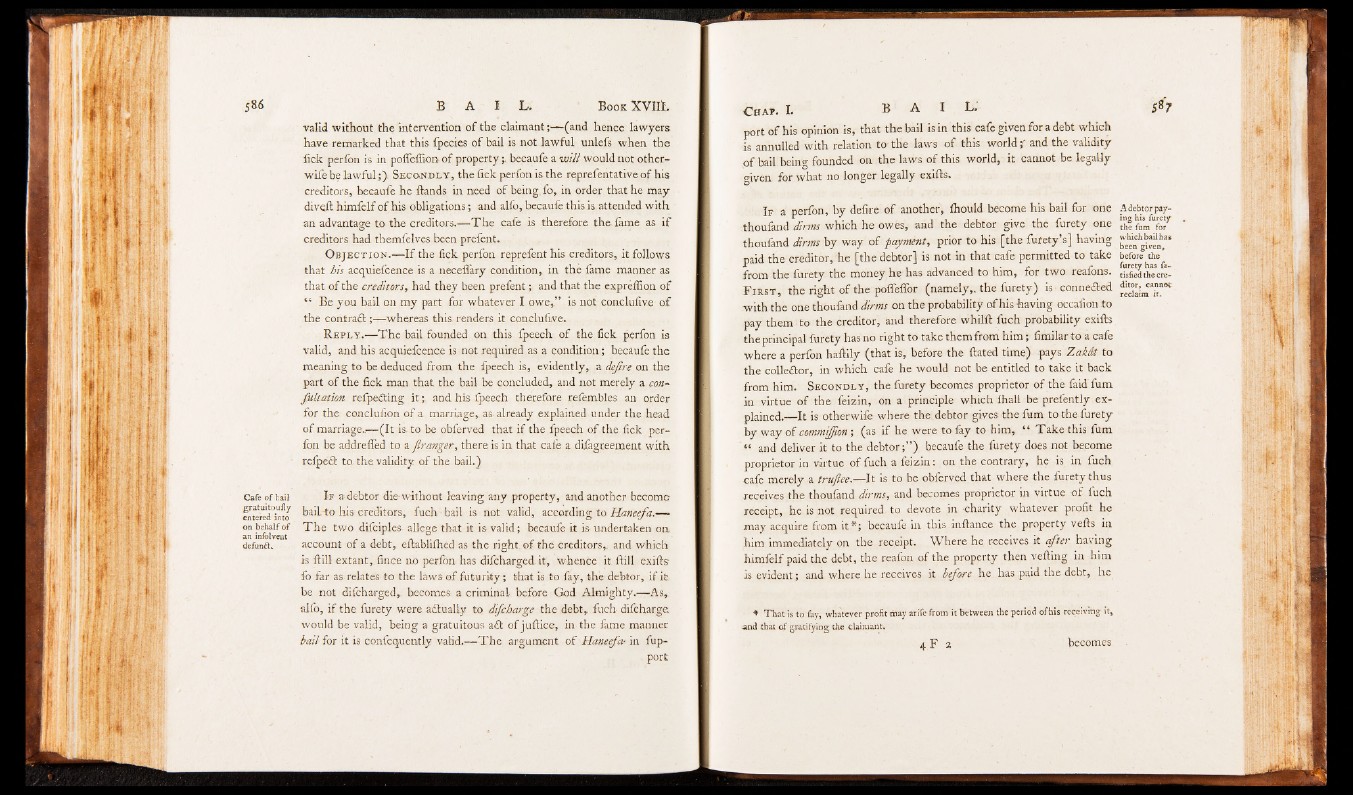
valid without the intervention of the claimant;— (and hence lawyers
have remarked that this fpecies of bail is not lawful unlefs when the
lick perfon is in poffellion of property;, becaufe a w ill would not other-
wife be lawful; ) Secondly, the fick perfon is the reprefentative of his
creditors, becaufe he Hands in need of being, fo, in order that he may
divert himfelf of his obligations; and alfo, becaufe this is attended with
an advantage to the creditors.— The cafe is therefore the fame as i f
creditors, had themfelves been prefent.
O b j e c t io n .— If the fick perfon reprefent his creditors, it follows
that his acquiefcence is a neceflary condition, in the fame manner as
that of the creditors, had they been prefent; and that the expreffion of
“ Be you bail on my part for whatever I owe,” is not conclufive of
the contraft;— whereas this.renders.it conclufive.
Re p l y .— T he bail founded on this fpeech of the fick perfon is
valid, and his acquiefcence is not required as a condition; becaufe the
meaning to be deduced from the fpeech is, evidently, a defire on the
part of the lick man that the bail be concluded, and not merely a consultation
refpefting it;, and his fpeech therefor© jefembles. an order
for the- conclufion of a. marriage.,, as- already explained.» under the head
of marriage..— (It is. to be obferved that if the fpeech of. the fick perfon
be addrelfed. to a jlranger, there is in that cafe a. difagreement w ith
' refpeft to, the validity of the bail.}
Cafe of bail
gratuitoufly
entered into
on behalf of
an infolvent
defundL
If a debtor die-without leaving any property, and another become
bail-to his creditors, fuch-bail is not valid, according to Haneefa.—
T h e two difciples- allege that it is valid; becaufe it is undertaken on
account of a debt, eftablifhed as the right, of the creditors, and which
is Hill extant, fince no perfon has difeharged it, whence it Hill exifts-
fo far as relates to the laws of futurity; that is to fay, the debtor, if it
be not difeharged, becomes a criminal before God Almighty.— As,
alfo, if the furety were aftually to difeharge the debt, fuck difeharga
would be valid, being a gratuitous aft of juftice, in the fame manner
bail for it is confequently valid..— T h e argument of Haneefa» in fupport
port of his opinion is, that the bail is in this cafe given for a debt which
is annulled with relation to the laws of this world r and the validity
,of bail being founded on the laws of this world, it cannot be legally
given for what no longer legally exifts.
If a perfon, by defire of another, fhould become his bail for one A debtor pay-
thoufand dirms which he owes, and the debtor give the furety one fUm'for7
thoufand dirms by way of payment, prior to his [the furety’ s] having _£“^ nh“
paid the creditor, he [the debtor] is not in that cafe permitted to take before ^the
from the furety the money he has advanced to him, for two reafons. tisfiedthecre-
F irst, the right of the poffelfor (namely,, the furety) is-connefted
with the one thoufand dirms on the probability of his having Occafion to
pay them to the creditor, and therefore whilft fuch probability exifts
the principal furety has no right to take them from him; fimilar to a cafe
where a perfon haftily (that is, before the ftated time) pays Zakdt to
the collector, in which cafe he would not be entitled to take it back
from him. S e c o n d l y , the furety becomes proprietor of the faid fum
in virtue of the feizin, on a principle which fhall be prefently explained.—
It isotherwife where the debtor gives the fum to the-furety
by way of commiffion',. (as if he were to fay to him, “ Take this fum
“ and deliver it to the debtor;” ) becaufe the furety does not become
proprietor in virtue of fuch a feizin : on the contrary, he is in fuch
cafe merely a irujiee.— It is to be obferved that where tne furety thus
receives the thoufand dirms, and becomes proprietor in virtue -of fuch
receipt, he is not required, to devote in charity whatever profit he
may acquire from it *; becaufe in this inftanoe the property vefts in
him immediately on the receipt. Where he receives it after having
himfelf paid the debt, the reafon of the property then vefting in him
is evident; and where he receives it before he has paid the debt, he
♦ T h a t is to fay, whatever profit riiay arife from it between the period o’fh is receiving it,
and that o f gratifying the claimant»
4 F 2 becomes